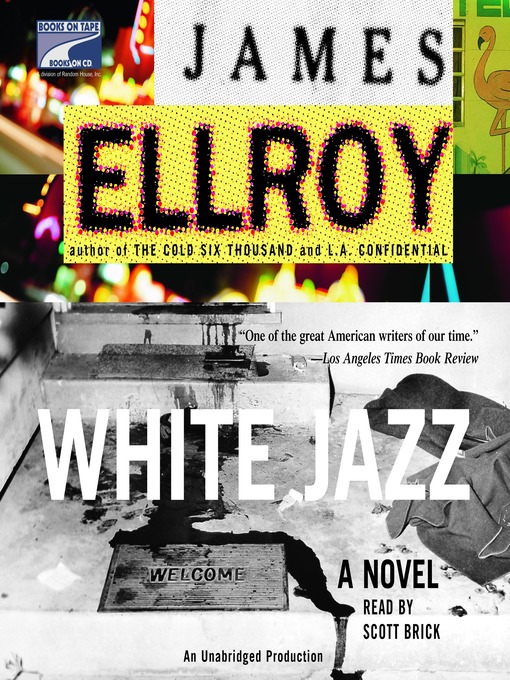 *I know this is the Audio Book cover, but it was the only photo with the appropriate resolution*
*I know this is the Audio Book cover, but it was the only photo with the appropriate resolution*Country: USA
Genre: Literary/Noir
Pages: 354
You'll often hear me say that James Ellroy killed, buried and dug noir back up to life, in the same fashion Dr. Frankenstein built a powerful monster out of body parts. White Jazz might just be the very embodiment of that. Half-way in between a literary experiment and the darkest, most twisted story of betrayal you've ever read, it closes his L.A Quartet in a blaze of glory. Reading White Jazz is like watching the sun set on classic noir with a strange sense of dread about the night who's dangerously young. It's by no means an easy read, but it cleared the way of any sort of moral boundaries to so many deranged writers that it has to exist and it has to be read. White Jazz is a loophole in the laws of literature.
James Ellroy tried to answer the following question: "What kind of story can endure the quasi-absence of image and still hold the road better than most crime novels?". Yep, you heard me. White Jazz doesn't have any description, metaphors or any consistent causality at all. It's narrated by Lieutenant Dave Klein, from the L.A.P.D, one of Ed Exley's men (remember him from L.A Confidential?). He's also one of the most corrupt and dangerous police officers you'll ever encounter. When assigned by Exley to solve a burglary case that happened at the house of one of LAPD's authorized drug dealers, he'll find out his boss is still trying to prosecute his arch-nemesis Dudley Smith (from the previous book, still) and start to work at that off-grid investigation also. Oh, and he's also a private contractor for Howard Hughes. Soon enough, Dave stirs up so much shit in Los Angeles' underworld that he becomes the most wanted man by both cops and criminal. And by that, I mean wanted dead.
The L.A Quartet novels (and James Ellroy's book in general) are such a pleasure to read, because they try to answer a very disturbing question: "Without the law, how can we police ourselves?" That's exactly why Ellroy is always so moral. When the set of rules goes out the window, you only have you inner self to guide you. That's why Dave Klein, despite being an amoral goon, is a very seductive character. He takes the right decisions to save himself, like working with Edmund Exley, who he respect but he's clearly not in love with. By taking a moral stance and teaming up with a man, who at least symbolizes law, he's taking a stance towards order, against the world that made him who he is. In other words, he genuinely wants to get out of the game, even if he's neck deep into it. It's always the most compelling characters that bury themselves in problems, and that makes for the best, continuous action scenes.
White Jazz gets a little more complex (well, very more complex to say the truth) from a literary point of view. It's written in a Joycian stream-of-consciousness style, a style where the non-sequitur and the automatic writing are king. It's as easy to read as doing some off road in a Lada. You get stuck, you lose direction all the time, you overheat. It's frustrating. Going through the first hundred page proved to be hard and somewhat confusing. But after a while, I took a notepad and a pen, and I started to have a real blast. Taking the pieces of information that Ellroy leaks to you and making the connections together before they even appear in the book is exhilarating. White Jazz is anything but a standard novel. It's bits and pieces of a story that eventually come together, but will make you work and think like a real detective. It's the hardest, yet most generous and twisted Ellroy novel I have read so far (it's my fourth, plus one short stories anthology). I would advise it to advanced readers, to people that read L.A Confidential already and to those who don't care spending an awful lot of time piecing things up together. If you love Ellroy, it's worth a shot.
